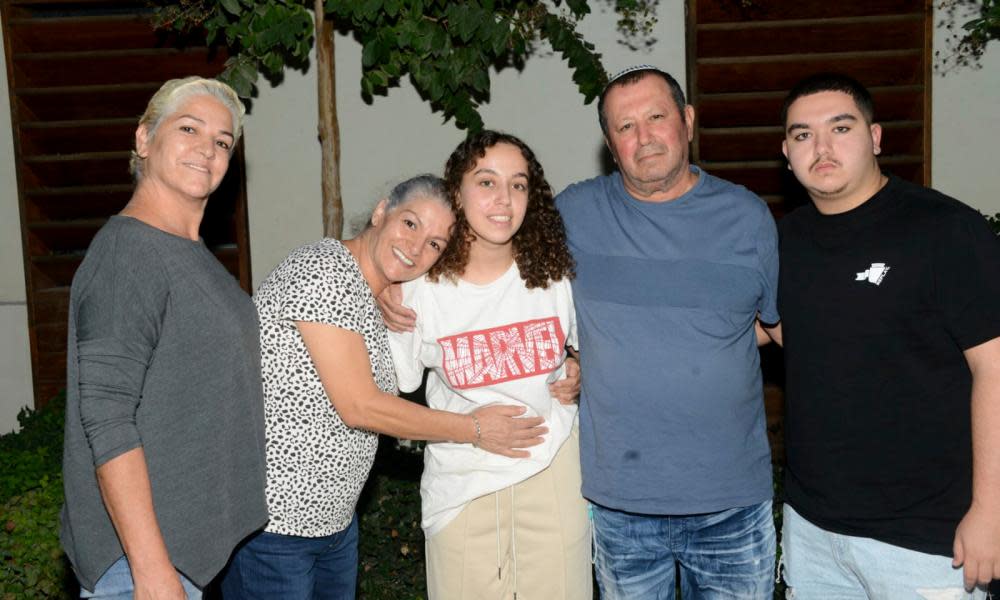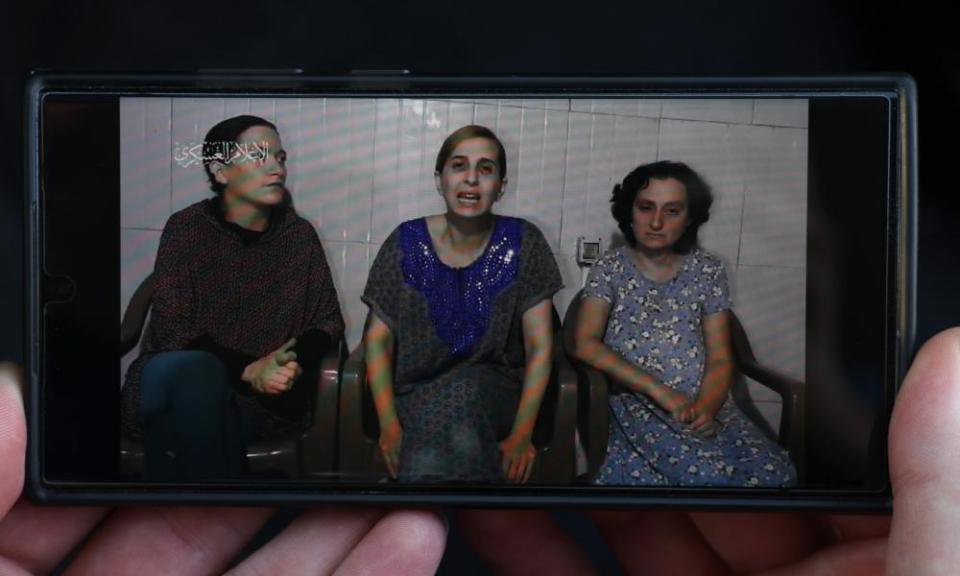Hostage soldier rescued in Gaza, says Israel

Israeli forces have announced the liberation of a hostage in Gaza hours after Hamas released a video of three other hostages who remain in captivity.
Ori Megidish, an Israel Defence Forces soldier, was freed during an escalating offensive in Gaza, the IDF and the internal security agency Shin Bet said in a joint statement on Monday night. It said she had undergone medical checks and was doing well.
The announcement followed the release of a video by Hamas in an apparent effort to put pressure on the government of Benjamin Netanyahu. The group’s military wing disseminated the clip via social media as Israeli forces advanced on Gaza City.
The women who appeared in the video are likely to have been filmed under duress. The Geneva conventions prohibit the taking of hostages.
The video description provided by Hamas said: “A number of Zionist prisoners held by al-Qassam send a message to Netanyahu and the Zionist government.”

Netanyahu condemned the video as “cruel psychological propaganda”. His office named the women as Danielle Aloni, Rimon Kirsht and Elena Trupanov. “I embrace you,” said the prime minister. “Our hearts are with you and the other captives.”
The Hostages and Missing Families Forum, an umbrella group for families of abductees, said the three women’s relatives would give a press conference in Tel Aviv later on Monday.
The 76-second clip showed the women seated together in plastic chairs in front of a tiled wall, facing the camera. They bore no visible signs of injury.
Only Aloni, seated in the centre, spoke. Gazing directly at the camera, she said they had been in captivity for 23 days, suggesting the video was filmed on Sunday or Monday, just over three weeks since Hamas militants stormed southern Israel on 7 October, killing more than 1,400 people and abducting more than 220.
Addressing Netanyahu directly, she accused the Israeli government of leaving her community defenceless during the Hamas attack. “We are getting punished for your political, national neglect,” she said. “Nobody came. Nobody heard us.”
She said there was supposed to be a ceasefire. “We are innocent citizens. Citizens who pay taxes to the state of Israel. You want to kill us all. You want to kill us all using the IDF.”
She pleaded for an exchange of hostages for Palestinian prisoners held in Israeli jails. “Let their citizens go, let their prisoners go. Free us. Free all of us. Let us return to our families now!” At the end she screamed “now” several times.
Aloni was kidnapped with her six-year-old daughter, Emilia, while visiting her twin sister, Sharon, in the Nir Oz kibbutz. Sharon Aloni Konio was also kidnapped with her husband and three-year-old twin daughters.
Trupanov and Kirsht remained silent and largely avoided looking at the camera. Trupanov was kidnapped from Nir Oz with several family members. Her husband was murdered. Kirsht was abducted from the Nirim kibbutz with her husband.
Hamas has offered to release hostages in return for an estimated 5,000 Palestinians incarcerated in Israel. Netanyahu has rejected an immediate swap and said the offensive in Gaza would press Hamas into making concessions.
Earlier on Monday, families of hostages gathered in central Jerusalem for an “empty beds” installation that placed 239 beds and bassinets at Safra Square, in front of city hall, representing the number of children and adults believed to be in captivity in Gaza.
“This is a way to visualise what happened. They are not in their own beds now. These beds are empty and under the sky,” said Eran Webber, an artist who organised the installation.
Yael Moshe, 48, held a placard of her mother, Adina Moshe, 72, who was abducted from the Nir Oz kibbutz after Hamas gunmen murdered her husband, David, 75.
“She has a heart condition but a strong spirit,” said Moshe. She expressed unease about the army offensive in Gaza. “My stomach hurts. I don’t want to think about it.”
Moshe implored the government to prioritise freeing the hostages, even if that meant emptying Israel’s prisons of Palestinians. “Whatever it takes, do it. I just want the hostages back. After that the government can do what it wants.”
Relatives of other hostages endorsed trading Palestinian prisoners, even incarcerated Hamas militants. “It’s a big price, nevertheless we care about our loved ones home. Let’s get them out, then we can take revenge for the massacre,” said Eyal Mor, 61. His uncle Abraham Munder, 78, was kidnapped along with Munder’s wife, Ruth, 78, daughter Keren, 53, and grandson Ohad, nine.
Tamar Goren, 62, whose daughter Shami is a hostage, supported the military offensive in Gaza but also favoured a prisoner swap. “No problem. All the Palestinians can go back,” Goren said.
It was a view echoed by Reut Eventov, 49, who held a placard of her abducted father-in-law, Haim Peri, 79. “Israel must bring the hostages home and deal with Hamas after.”

 Yahoo News
Yahoo News 
